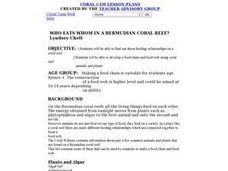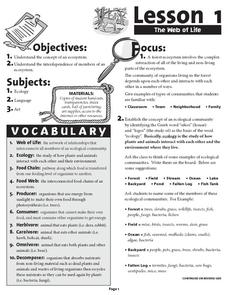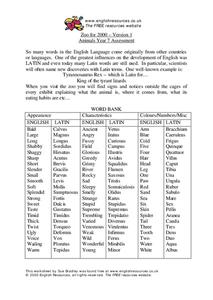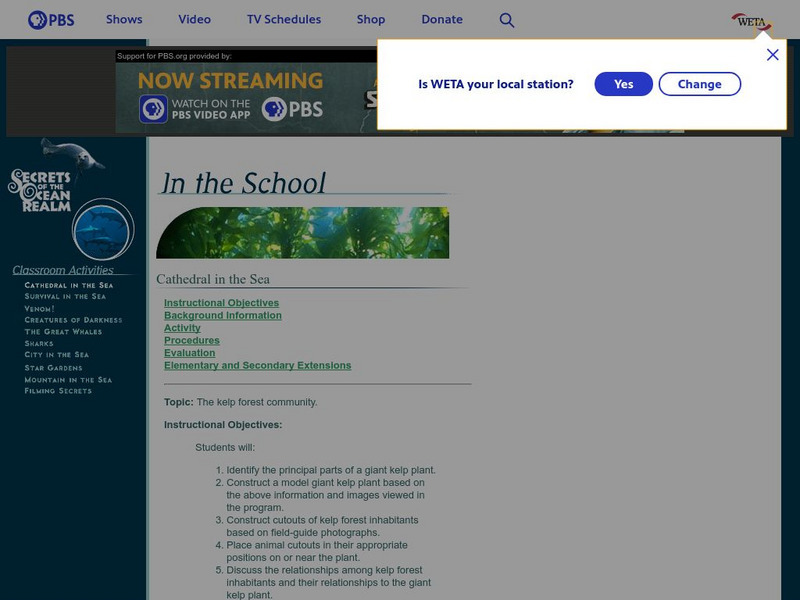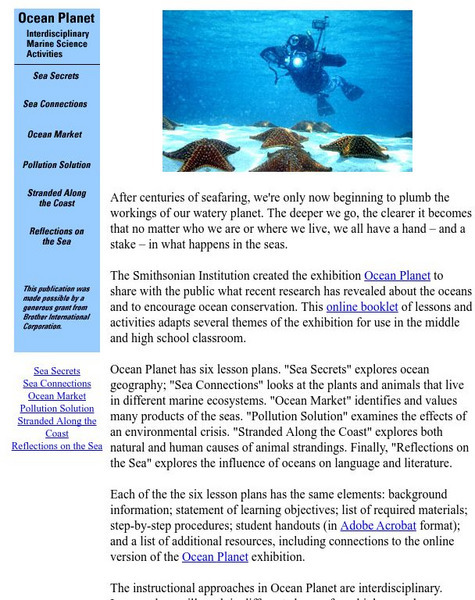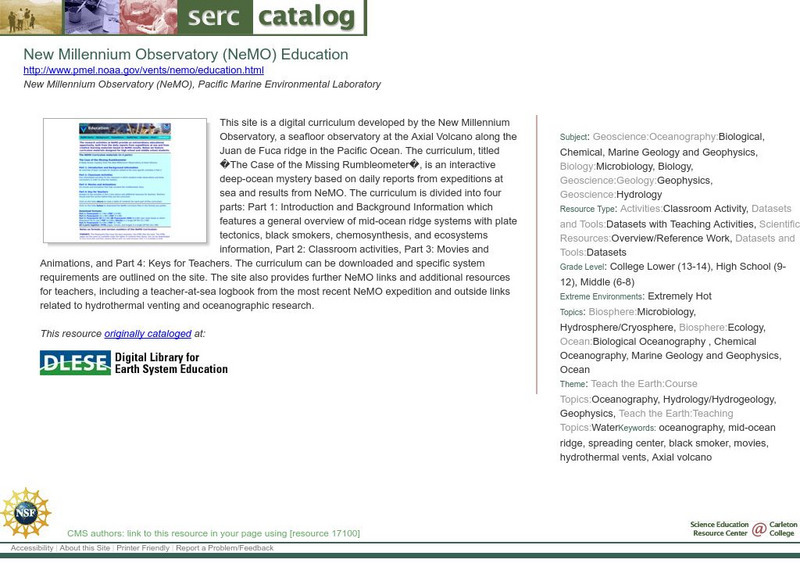Curated OER
Leaving Home
Students explain the importance of larval dispersal and retention to populations. They collect data on organisms and examine it.
Curated OER
Who Eats Whom in a Bermudian Coral Reef?
Learners will be able to find out about feeding relationships on a coral reef. They then will be able to develop a food chain and food web using coral reef animals and plants using the Coral Website.
Curated OER
Alternative Alphabet
Learners determine and compare hieroglyph content and frequency to sentences constructed in an alternative alphabet based on symbols that mimic sounds of the alphabet. They decide which images are hieroglyphs and which ones are not.
Curated OER
Ocean Microstructure Lesson Plan
Students explore the microstructure of the ocean by analyzing graphs created by Dr. Mike Gregg of the University of Washington Applied Physics Laboratory during the EPIC 2001 research cruise on the Ronald H. Brown NOAA vessel.
Curated OER
OaxacaTurtles
Pupils identify types of turtles off the coast of Oaxaca. They become acquainted with the Mexican Turtle Center. They create a project (mural, map, panel discussion, logo/design) to communicate researched information.
Curated OER
The Web of Life
Students participate in a game in which they discover the balance of life in the ocean. They identify different organisms that rely on different types of food. They answer questions to complete the instructional activity.
Curated OER
TE Lesson: Caught in the Net
Students student the concept of bycatch, the act of unintentionally catching certain living creatures using fishing equipment. They determine the difference between bycatch and target creatures. They discover what species become bycatch...
Curated OER
Learning About Bears And Dolphins
Seventh graders engage in a study that compares the body structures of bears and dolphins. They conduct research to find information and use questions to find the differences or similarities and then conduct a class discussion about the...
Curated OER
Water Quality Monitoring
Students comprehend the four parameters of water quality. They perform tests for salinity, dissolved oxygen, pH and clarity or turbidity. Students comprehend why scientists and environmental managers monitor water uality and aquatic...
Curated OER
Zoo Animals
In this zoo animals worksheet, students create five new animals and write the zoological descriptions of them following a detailed description on how to complete the assignment. Students practice using Latin words and find the animals...
Curated OER
Oddball Out: Shells
In this problem solving worksheet, students analyze a row of pictures of various shells to determine which creature is different from the others pictured.
Curated OER
Global Change — Change and Cycles Where Land, Air and Water Meet
Pupils participate in an experiment to define a parts-per-billion solution. In this ecology lesson, students select a second substance to create a parts-per-billion solution and observe and record their results. Pupils work in groups to...
Curated OER
Creatures That Glow In The Night
High schoolers investigate the different bioluminescent organisms. They use microscopes in order to make observations and draw what is seen. Students demonstrate they have studies the differences between the process of photosynthesis and...
Climate Literacy
Clean: Impacts of Topography on Sea Level Change
Students use web-based animations to explore the impacts of ice melt, specifically changes to sea level. They also use topographic maps to examine the relationship between topography and sea level change by mapping changing shorelines.
Scholastic
Scholastic: Ocean Life
Learn about leatherback turtles and dusky dolphins with the Earthwatch research teams in Costa Rica and New Zealand. Choose which animal you would like to learn more about then read field reports, meet a researcher, become a researcher...
PBS
Pbs Teachers:cathedral in the Sea: Construct a Model Kelp Forest
Investigate the relationships among kelp forest inhabitants and their relationships to the giant kelp plant. List the parts of a giant kelp plant and construct a model of a kelp forest habitat.
Smithsonian Institution
Smithsonian Education: Ocean Planet
A series of lesson plans designed to be used with the Smithsonian Ocean Planet exhibit (available online). Lesson topics include marine ecosystems, pollution of ocean water, animal strandings, and literature.
Science Education Resource Center at Carleton College
Serc: New Millennium Observatory (Ne Mo) Education
This digital curriculum is an interactive deep-ocean mystery based on daily reports from expeditions at sea and results from NeMO and consists of four parts: Introduction and Background Information, Classroom activities, Movies and...
PBS
Pbs Learning Media: The Lowdown: Brief History of the First Earth Day and What We Can Learn From Its Success Lesson Plan
Earth Day grew out of the environmental movement in the late 1960s in response to a series of environmental disasters that took lives, marred natural beauty and threatened animal species. An estimated 20 million Americans participated in...
Other popular searches
- Sea Prehistoric Animals
- Sea Animal Life Cycle
- Sea Animal Research
- Animal Under the Sea
- Animals. Sea
- Sea Animal Art
- Sea Animal Research Projects
- Animals Sea
- Sea and Land Animals
- Sea Animal Game
- Sea Animal Defenses
- Sea Animal Lesson Plans

